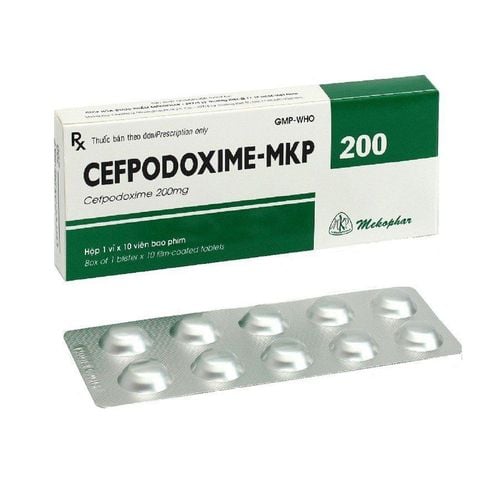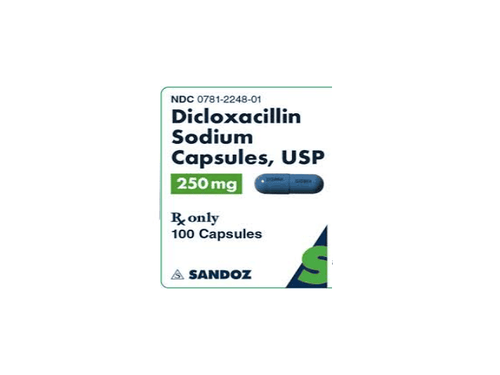This is an automatically translated article.
Belridan belongs to the group of drugs that treat parasites, infections, viruses and fungi. It is used to treat mild to moderate infections caused by susceptible bacteria.
1. What is the effect of Belridan?
Belridan is used to treat patients with mild to severe infections caused by the following microorganisms sensitive to cefpodoxime:
Treatment of acute otitis media caused by Streptococcus pneumoniae, Haemophilus influenzae (including β-lactamase-producing strains), or Moraxella (Branhamella) catarrhalis. Treatment of pharyngitis or tonsillitis caused by Streptococcus pyogenes bacteria. Treatment of community-acquired pneumonia caused by S.pneumoniae, H.Influenzae or M.Catarrhalis. Treatment of acute exacerbations of chronic bronchitis caused by S.Pneumoniae, H.influenzae (strains that do not produce β-lactamases) or M. Catarrhalis. Treatment of acute uncomplicated cervical and urethral gonorrhea caused by Neisseria gonorrhoeae (including penicillinase-producing strains). Treatment of acute uncomplicated anal and rectal infections in women caused by infection with Neisseria gonorrhoeae (including penicillinase-producing strains). Treatment of uncomplicated skin and skin structure infections caused by Staphylococcus aureus and Streptococcus pyogenes bacteria. Treatment of acute maxillary sinusitis caused by Haemophilus influenzae (including β-lactamase producing strains), Streptococcus pneumoniae and Moraxella catarrhalis. Treatment of uncomplicated urinary tract infections caused by the bacteria Escherichia coli, Proteus mirabilis, Klebsiella pneumoniae or Staphylociccus saprophyticus.
2. Dosage and how to use Belridan
Belridan is for oral use and should be taken with food to increase absorption. The patient mixes the powder into a glass of water about 30ml (do not use milk, coffee, tea, soft drinks, carbonated water, calcium to make the medicine). Drink the medicine right after it has been mixed, before taking it, stir the medicine well.
Dosage in adults and adolescents > 12 years old:
Acute community-acquired pneumonia: 400mg dose at a frequency of 200mg every 12 hours, dosing for about 14 days. Acute exacerbation of chronic bronchitis: 400mg dose with a frequency of 200mg every 12 hours, taking the drug for about 10 days. Acute maxillary sinusitis: 400 mg dose with a frequency of 200 mg every 12 hours, taking the drug for about 10 days. Pharyngitis and/or tonsillitis: 200 mg dose with 100 mg dose every 12 hours for 5-10 days. Uncomplicated gonorrhea, rectal gonococcal infection (female): 200 mg dose and 1 single dose per day. Uncomplicated skin and skin structure infections: Dosage 800mg with a frequency of dosing 400mg/every 12 hours for 7-14 days. Uncomplicated urinary tract infections: 200mg dose with a frequency of 100mg/every 12 hours for 7 days treatment. Dosage in renal impairment:
In patients with severe renal impairment (creatinine clearance < 30 mL/min), the dosing interval should be increased to 24 hours. In patients on hemodialysis, the dose should be administered at an interval of 3 times/week, after dialysis. Dosage in patients with cirrhosis:
Patients with cirrhosis: No dose adjustment of Belridan is necessary for these patients. Children from 2 months to under 12 years old:
Acute otitis media: Dose: 10mg/kg/day (maximum 400mg/day) frequency of drug use 5mg/kg every 12 hours (maximum 200mg/dose), treatment in 5 days. Pharyngitis, tonsillitis: Dosage 10mg/kg/day (maximum 200mg/day) frequency of dosing 5mg/kg/dose every 12 hours (maximum 100mg/dose), treatment for 5-10 days. Acute maxillary sinusitis: Dosage 10mg/kg/day (maximum 400mg/day) frequency of dosing 5mg/kg every 12 hours (maximum 200mg/dose), treatment for 10 days.
3. Contraindications to the use of Belridan
Belridan should not be used in patients with a history of allergy or hypersensitivity to cefpodoxime or other cephalosporin antibiotics.
4. Belridan drug interactions
Possible interactions if Belridan is used concurrently with some of the following drugs:
Antacids: Sodium bicarbonate and aluminum hydroxide, oral anticholinergics (propanthelin). Probenecid: As with other β-lactamase antibiotics, renal elimination of cefpodoxime is inhibited by probenecid and as a result, cefpodoxime AUC is increased by approximately 31%, peak plasma concentrations 20% increase. Nephrotoxic drugs: Although there are no data on nephrotoxicity with Cefpodoxime alone. However, patients should closely monitor renal function when taking Cefpodoxime with these drugs. Warfarin can cause an increased effect on blood clotting, patients should be regularly monitored INR during the day immediately after taking the drug with an oral anticoagulant. Drugs that neutralize gastric pH or inhibit acid secretion can increase the bioavailability of cefpodoxime by about 30%. These drugs should be taken 2-3 hours before taking Cefpodoxime.
5. Side effects when using the drug Belridan
During the treatment with Belridan, patients may experience some unwanted side effects such as:
Common: Diarrhea, loose stools, frequent bowel movements, abdominal pain, nausea, indigestion and flatulence, headache, rash, urticaria, itching. Uncommon: Rash, serum sickness-like reactions, fever, arthralgia, anaphylactic reactions, erythema multiforme, hepatitis, liver enzyme disorders, cholestatic jaundice. Rare: Eosinophilia, blood disorders, interstitial nephritis, hyperactivity, trouble sleeping, agitation, dizziness, vertigo, hypertonia. Patients should report all unusual symptoms encountered while using Belridan.
6. Precautions when using Belridan
Cefpodoxime proxetil should be used with caution in patients with a history of hypersensitivity to cefpodoxime, other cephalosporins, penicillins, other drugs. In patients with renal insufficiency resulting in temporary or persistent diuresis, the total daily dose of cefpodoxime proxetil should be reduced. Cefpodoxime proxetil may cause overgrowth of non-susceptible organisms. Belridan is not used to treat viral infections such as colds. There are no adequate and well-controlled data on the use of cefpodoxime proxetil in pregnant women and should only be used when clearly needed and under the direction of a physician. Cefpodoxime has the potential to cause dangerous reactions in a nursing infant. Therefore, the mother needs to consider whether to stop breastfeeding or stop taking the drug to limit the effect on the baby. The article has provided information about the uses, doses and precautions when using Belridan. To ensure safety for your health and maximize the effectiveness of treatment, you need to take Belridan exactly as directed by your doctor, do not increase or decrease the dose or give prescriptions to others to use.
Please dial HOTLINE for more information or register for an appointment HERE. Download MyVinmec app to make appointments faster and to manage your bookings easily.













